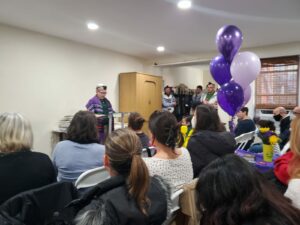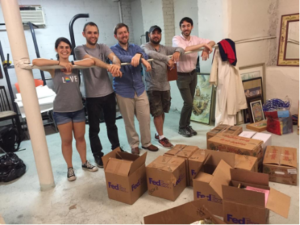In the Spring of 2017, a group of neighbors gathered with the question: ‘What are we going to do this Shabbat?’ After seeing the need for a prayer space in Harlem that felt truly inclusive and accepting of anyone who may walk through the door, they were determined to build the community they could not find. Born from this was Kehillat Harlem, a prayer space committed to Halachah (Jewish law) while holding this mission of inclusivity at its core. Fortunately, a proclivity for creativity led to the creation of the Harlem Shtiebl (shtiebel, meaning “little Room”). Kehillat Harlem saw in one community member’s garage (he was a superintendent of a building) the perfect space to gather. Pulling gym equipment to the side (they happened to make great coat racks), we found space for our small community. Determined to grow, we brought in a synagogue consultant to point us in the right direction. Sadly, after bringing our community members together over a few months in the summer of 2018, it became clear that we would lose our space. A university had purchased the building where we were meeting, and our friend and neighbor, the superintendent, was being moved to a new building on the Upper West Side.
As we packed and moved into storage, we were humbled but ultimately determined to keep Kehillat Harlem alive. We continued to meet every Friday evening, no matter who came or where we found space. And it was more than once when there were only three or four of us there, but we sang Kabbalat Shabbat with the energy of a congregation. We used the JCC Harlem monthly, but on other weeks we jumped between community members’ homes. Meanwhile, we never stopped searching for another space, though our budget was incredibly limited. We did not find a space before the onset of the COVID-19 pandemic, which, ultimately, was for the best because we were not saddled with the cost of space. Instead, we could focus on keeping our community connected.
It is often hard to see all that we are gaining when we are going through difficulties, yet we gained so much through these months without a space and, later, in the first two years of the pandemic. In the months following our exit from the literal shtiebel, we found our community investing in ways they had not previously. People were offering their homes for services and meals and stepping up to make sure we kept moving forward.
In the months following the initial dissemination of the first dose of COVID-19 vaccines in New York, I received Smicha (rabbinic ordination) from Yeshivat Chovevei Torah and was fortunate to have been approved for a grant from Start-Up Shul, which allowed me to come on as the full-time rabbi (and only employee) of Kehillat Harlem. We were still not meeting indoors, but we saw 15 people show up to the park in the middle of a snowstorm for a hot bowl of cholent (slow-cooked stew) and a similar turnout on sub-zero temperature days. This reflected back exactly how needed our work was and also how committed our community members were to showing up. We also strengthened community partnerships, restarting monthly Friday nights at the JCC Harlem and meeting outside at a local bar for a class through IYUN on Wednesday evenings (shoutout to Harlem Hops, the first fully black-owned craft beer bar in Harlem whose charity, Harlem Hopes, provides students with scholarships to attend HBCUs).
The search for a space never fully left our minds, but it came to the fore in the middle of last year. We continued to grow our monthly programming at the JCC Harlem, while raising our cap and moving indoors. In April 2022, we marked our fifth anniversary since that day in 2017 when we were dreamed into being. Over 70 people showed up on that Friday night in April, and nearly 40 joined for our first Saturday morning service since being at the Shtiebl. All at once, it became clear that space was quickly becoming a top priority. However, after months of searching, it also became clear that space in NYC was not within our budget.
 Harkening back to our creative roots, my wife, Liran, and I combined budgets with the synagogue. Combined, we managed to find a multi-level apartment in a brownstone that had a bedroom but also had a living area large enough to host 50-60 people. This milestone, which occurred in September of last year, has allowed us to take the next step in our community’s growth. Now, we have multiple Shabbat and holiday programs each month, in addition to a weekly class, a once-per-week co-working space, and various other programs. We even had our first community Bar Mitzvah in January!
Harkening back to our creative roots, my wife, Liran, and I combined budgets with the synagogue. Combined, we managed to find a multi-level apartment in a brownstone that had a bedroom but also had a living area large enough to host 50-60 people. This milestone, which occurred in September of last year, has allowed us to take the next step in our community’s growth. Now, we have multiple Shabbat and holiday programs each month, in addition to a weekly class, a once-per-week co-working space, and various other programs. We even had our first community Bar Mitzvah in January!
I am sure we will face other challenges in the future, but for now, I am feeling grateful for our new Shtiebl and for all that we learned and gained along the way.

Rabbi Savitch received semikha from Yeshivat Chovevei Torah in 2021. He has been active in the Harlem Jewish community since 2016 and helped to found the Harlem Moishe House in 2018. Kyle and his wife, Liran, live in Central Harlem, where they enjoy having guests for Shabbat meals. In his free time, Kyle enjoys cooking and rock climbing.


